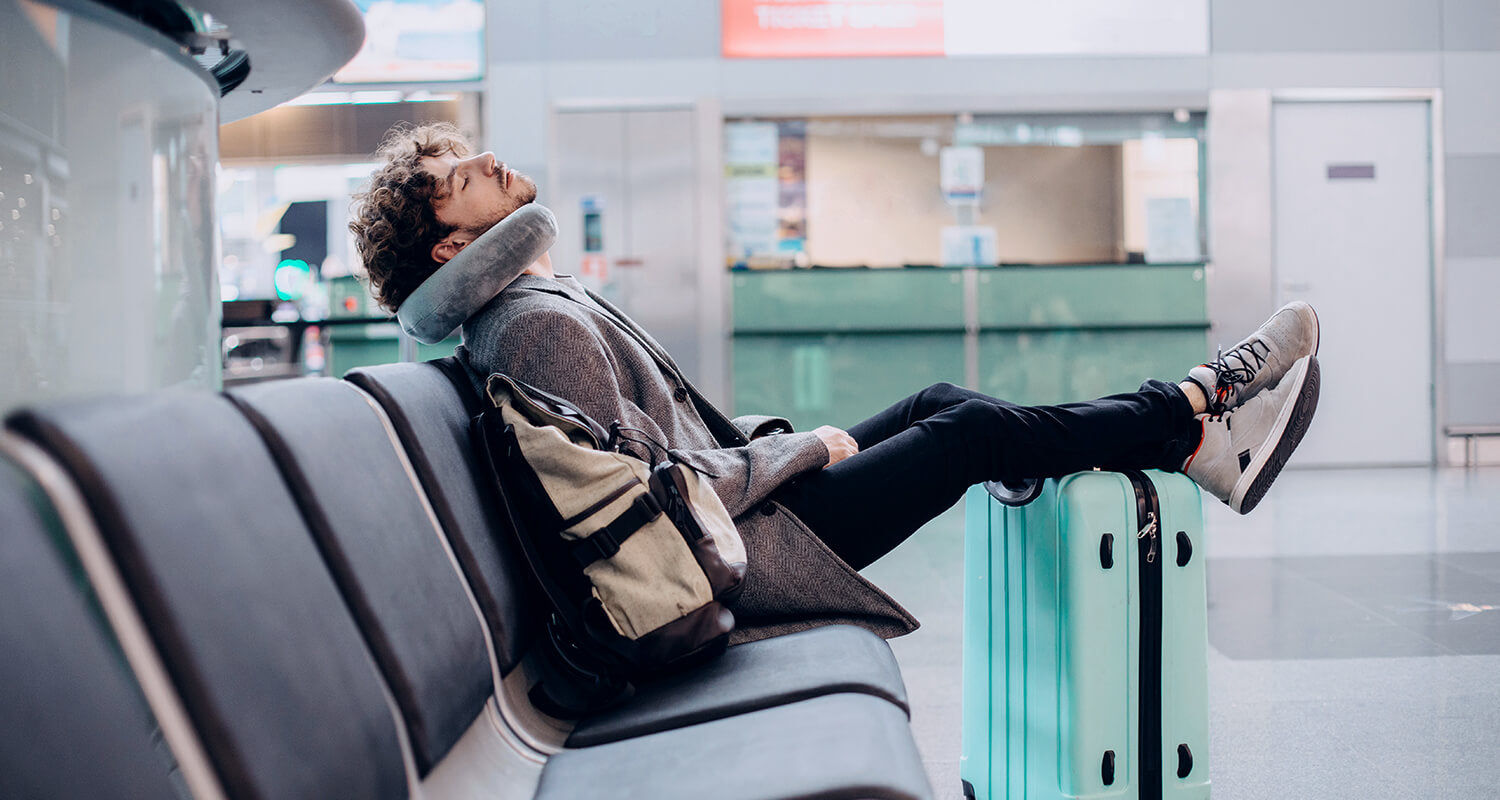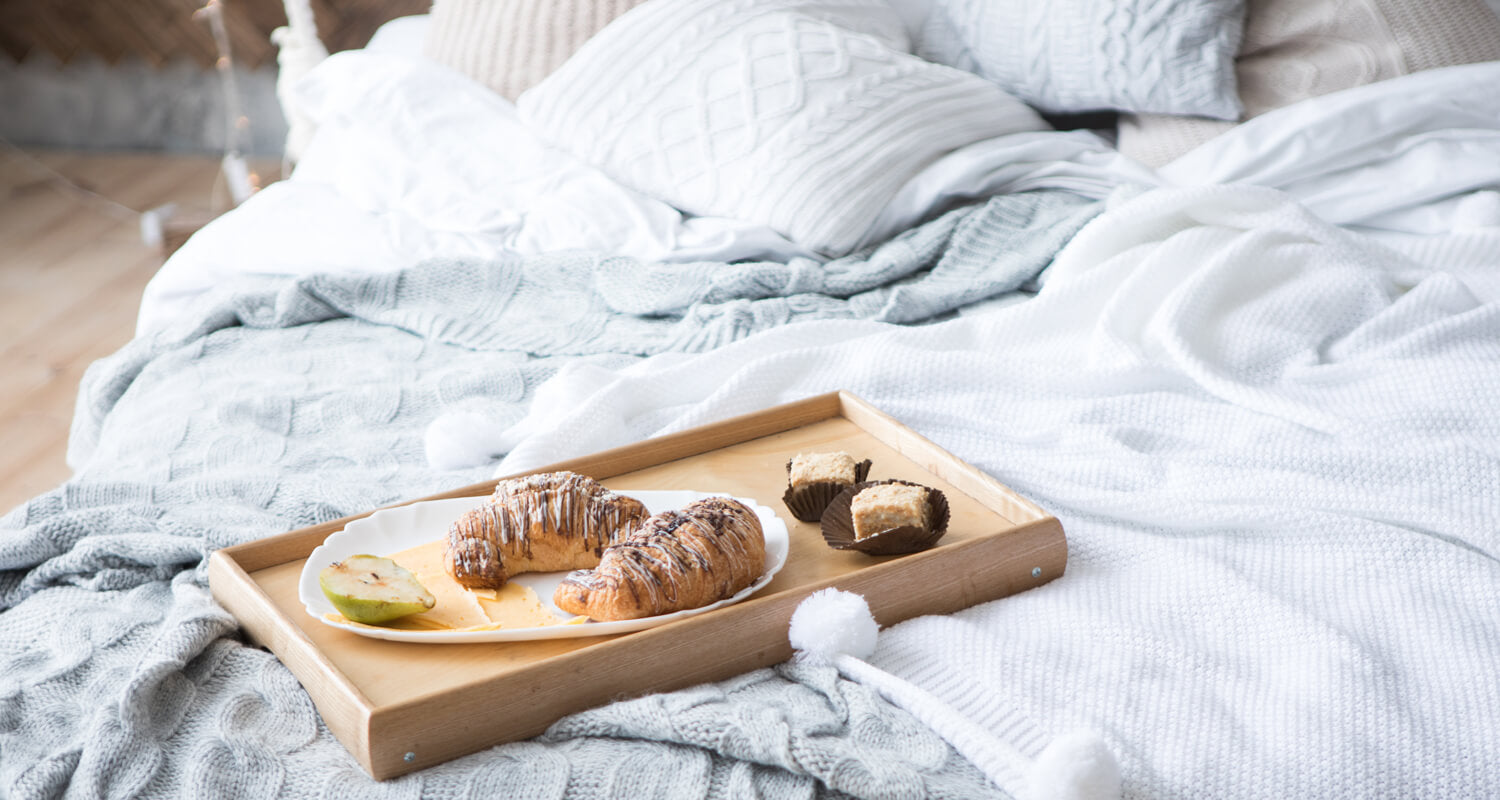
Sleep while traveling – The best tips for sleeping on the go
Sleep well on the go? Not that easy! Good sleep is important, especially on vacation or on business trips, in order to be fit and make the most of your travel time. Here you can find out what you can do to sleep better while traveling and how you can start the day full of energy despite time differences while on the road and at your destination.
Table of contents
- Sleep while traveling
- What effect does lack of sleep have?
- Sleep tips: Sleep better when traveling
- Creating the ideal sleeping environment
- Maintain sleeping habits
- Observe nutrition and fluid intake
- Soak up the daylight and keep moving
- Natural support: dietary supplement with melatonin
- Conclusion
1. Sleep while traveling
No matter whether it's for business, with family, partner or best friends - we all go on a longer trip every now and then. When traveling in the car, on the train or on the plane and even at the destination itself, sleep is often neglected, but it is not only important for our performance, but also for our health. Especially in unfamiliar situations such as traveling, perhaps even across different time zones, our sleep, the sensitive sleep-wake rhythm and our body sensation are heavily influenced.Especially when traveling with a time difference, the body's own circadian rhythm, the famous "internal clock", gets out of sync and our sleep-wake rhythm no longer corresponds to the natural course of the day in our new environment.Our body then needs some time to adapt to the new circumstances. But deviating from fixed sleep routines, an unfamiliar sleeping environment or changed eating habits can also disrupt sleep when traveling and mean that we have difficulty falling asleep, are repeatedly woken from sleep and generally feel unwell feel.
2. How does lack of sleep affect you?

In order to make the most of limited vacation days or short business trips, travelers often forego valuable hours of sleep. Overtiredness & lack of sleep not only have a negative impact on physical well-being and memory, but also impair, among other things, the ability to process information and also promote mood swings, emotional instability and attention deficits. All things that you don't want, whether it's a business trip or a vacation trip.
But don't worry! We'll show you four quick tips on how to support a restful sleep on the go and in strange places! By the way, you can read about how to specifically combat jet lag and the effects of a time zone change here.
3. Sleep tips: Sleep better when traveling
#1 Creating the ideal sleeping environment
Peace, relaxation and a comfortable sleeping environment are important prerequisites for a restful sleep. Especially when we are traveling and sleeping in “strange beds”, our sleeping environment and its smells, noises or the room climate quickly appear unfamiliar and unfamiliar.
On the go
Depending on the duration and time of the journey, it is sometimes unavoidable to sleep in the car, train or plane while on the move. Loud noises, such as machine noise or fellow passengers, can disrupt sleep while on the move. It's best to use earplugs or sturdy headphones to block out noise and find more peace. The narrow plane or car seat can also get in the way of a restful sleep because you simply cannot find a comfortable sleeping position. With a travel pillow you can create some comfort even in unusual lying or sitting positions and particularly prevent headaches and neck pain. A sleep mask can also be a good idea if too bright or too much light prevents us from sleeping while on the move. An ideal sleep environment cannot always be found while traveling, but with some planning in advance, it is possible to support good quality sleep and get a restful night's sleep, even when traveling.
Numerous factors can also affect our sleep at our destination. It is therefore important to choose your accommodation, because here too you should be able to set up a comfort zone in order to make your sleeping environment as pleasant as possible. Taking your own pillow with you when traveling can help you maintain familiar sleeping habits and increase comfort in your hotel bed. It is also a good idea to choose a hotel that is in a quiet area. This way you can ensure that the hustle and bustle no longer haunts you at night and that you can fall asleep without disturbing noises such as street noise. Also avoid particularly bright light (including screen light) before going to bed and try to keep the bedroom as dark as possible and at a cool temperature (16 °C - 18 °C). A pleasant sleeping environment promotes a peaceful sleep and nothing stands in the way of a rested start to your holiday!
#2 Maintain sleeping habits
A sensible sleep routine supports your sleep! In order to sleep well in a strange place, you should try to deviate from your habits as little as possible. Stick to your usual sleep and wake times, sleep for about the same amount of time as usual, and eat the first and last meals of the day at the usual time. Especially when traveling across time zones, too many sleep breaks and naps can be counterproductive. They may reduce the need for sleep and reduce the natural tiredness that would help the body adapt to an earlier or later sleep time at the destination.
#3 Pay attention to nutrition and fluid intake
When we travel, our eating habits change. We tend to eat more than usual and deviate from our usual diet. But here too, try to change as little as possible and stay true to your routines. Also make sure to eat food that is easy to digest and as rich in protein and carbohydrates as possible so as not to put additional strain on the body and at the same time provide it with enough energy.
Many people find it difficult to drink enough, especially when traveling. Especially when there are strong drafts or the dry air on a plane, it is even more important to supply the body with enough fluids and prevent dehydration. Drink at least 2 liters of water a day to keep you fit and your metabolism active. Due to their stimulating effect, you should also avoid caffeinated and alcoholic foods, as these can disrupt sleep and make it difficult to fall asleep easily. In this way, you help your body prepare for the night as usual and fall asleep quickly.

You can find out more about the connection between nutrition and sleep in this article.
#4 Stock up on daylight and keep moving
Sunlight controls our internal clock and regulates the daily sleep-wake rhythm. It is therefore important to consume plenty of daylight, especially when traveling. This helps the body adapt to unfamiliar circumstances at the destination and can counteract jet lag when traveling through different time zones. Physical activity also has a positive effect on the internal rhythm, gets the circulation going and not only helps against acute fatigue, but also has a positive effect on falling asleep in the evening. Exercise in daylight and in the fresh air is always a good idea, whether before, during or after your trip!
4. Natural support: Melatonin
The sleep hormone melatonin is an important regulator of our sleep-wake rhythm and is already known as an effective means of supporting the sleep process. Taking melatonin while traveling can help you get to restful sleep more quickly and be ready for the day in the morning. A dietary supplement with melatonin can also reduce the effects of jet lag when traveling across different time zones and help the body quickly get used to the unusual daily rhythm at the destination. If you would like to know more about the effects and use of melatonin as a dietary supplement, you can find more information here.
5. Conclusion
-
When traveling, challenging lying and sleeping conditions get in the way of a restful sleep.
-
Adapt your sleeping environment to your needs and habits as much as possible, even when traveling.
-
Maintain your sleep habits and sleep routines.
-
Avoid caffeine and alcohol, drink enough fluids and choose light meals rich in protein and carbohydrates.
-
Before departure, on the way and at your destination: stay active and moving and consume plenty of daylight
-
Dietary supplements with melatonin naturally support sleep and can reduce the feeling of jet lag.
Greetings and see you soon!




Leave a comment
This site is protected by hCaptcha and the hCaptcha Privacy Policy and Terms of Service apply.